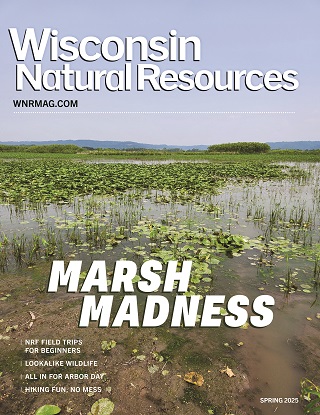Contact: Brad Hutnik, DNR Forest Ecologist and Silviculturist
Bradley.Hutnik@wisconsin.gov or 608-574-5642
Explore Wisconsin's Stunning Fall Foliage On Your Next Outdoor Adventure
 The annual process starts in late September in the northern part of the state and slowly spreads southward. Leaves show off blazing reds, deep oranges and vivid yellows.
Photo credit: Wisconsin DNR
The annual process starts in late September in the northern part of the state and slowly spreads southward. Leaves show off blazing reds, deep oranges and vivid yellows.
Photo credit: Wisconsin DNR
MADISON, Wis. – Autumn is here, and the Wisconsin Department of Natural Resources (DNR) encourages the public across the state to get outside and enjoy Wisconsin's amazing fall colors over the coming weeks.
Many of the state's trees have begun to show off their autumn colors, brightening the view for state residents and visitors everywhere, from the neighborhoods and parks in our urban areas to our tree-lined country roads.
“It's a brilliant and colorful display,” said Scott Lyon, DNR forest products team leader. “The Badger State is home to many deciduous hardwood species which change colors and lose their leaves as the seasons change, including maple, oaks, hickories and aspen.”
The annual process starts in late September in the northern part of the state and slowly spreads southward. Leaves show off blazing reds, deep oranges and vivid yellows, all created through natural processes based on biology and chemistry.
Some of the best viewing opportunities in the state can be found within Wisconsin's state forests, parks, recreation areas and trails. Many state forests were formed around watersheds, offering visitors a way to admire fall colors while taking part in other recreational activities along Wisconsin's lakes, rivers and streams.
Further, Travel Wisconsin's Fall Color Report provides a regularly updated online fall colors guide to steer leaf-chasers in the right direction, as well as a list of 11 scenic drives visitors can take to experience the seasonal beauty.
Colors Closer To Home
Residents of larger communities need not travel far to take in fall's splendor –gorgeous fall colors can be found in Wisconsin's urban areas. Visitors can enjoy the beauty of the season while visiting an arboretum, botanical garden, scenic overlook or on a guided tree walk.
This list, provided by DNR urban forestry program coordinator Patricia Lindquist, presents some solid options:
Arboretums: The University of Wisconsin-Madison Arboretum maintains more than 17 miles of trails through woodlands, savannas, restored prairies and wetlands. Its horticultural collections feature trees and shrubs from around the world and represent the state’s largest woody plant collection. At almost 200 acres, Forest Home Cemetery and Arboretum is the largest green space in the city of Milwaukee.
Botanical Gardens: The Rotary Botanical Gardens in Janesville has more than two dozen different garden styles, including a Japanese Garden that is consistently listed as one of the top 25 Japanese Gardens in North America. The fall colors can be spectacular. The Green Bay Botanical Gardens offer activities such as a Fall Colors Pop-Up Tour and a Fall Colors iPhone Photography class.
Scenic Overlooks: Gaze at the stunning fall colors for miles around from a scenic overlook such as Grandad Bluff in La Crosse, Granite Peak at Rib Mountain State Park near Wausau or even the top of a tall building such as the observation deck at the State Capitol in Madison.
Guided Tree Walks: Several Wisconsin communities have created self-guided tree walking tours that are a wonderful fall activity. Cedarburg's Trees of Distinction walk will introduce you to many of the beautiful trees in this city, some of which are older than the city itself. Hudson offers five Tree Treks throughout the city to cultivate the arborist in you.
Identifying Trees By Fall Colors
You can use the fall leaf color to help identify different tree species. Look for these colors on the trees in your neighborhood, yard or local park:
- Oaks: Red, brown or russet
- Hickories: Golden bronze
- Dogwood: Purple-red
- Birch: Bright yellow
- Poplar: Golden yellow
- Maple trees show a range of colors:
- Sugar maple: Orange-red
- Black maple: Glowing yellow
- Red maple: Bright scarlet
Looking for a specific tree species? The DNR's Forest Inventory and Analysis program conducts Wisconsin's tree census with valuable information about forests in the state, including which species are prevalent in specific locations.
Explore the DNR's guide to fall colors for more about the the science behind the color change.

